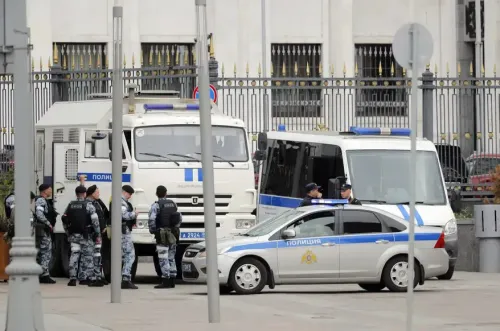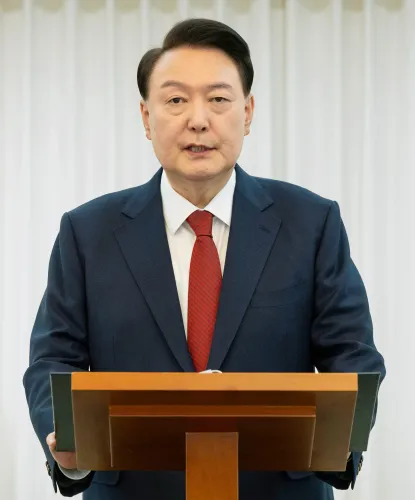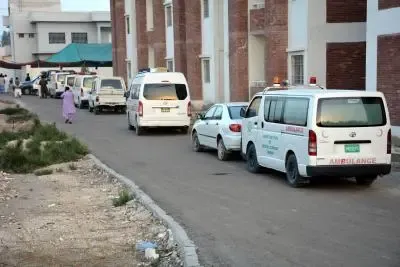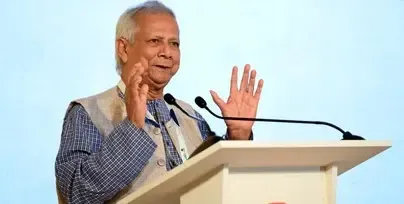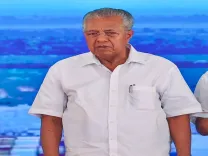Ahmed al-Sharaa's trip to Saudi Arabia marks a new chapter in Syria's international relations, experts say
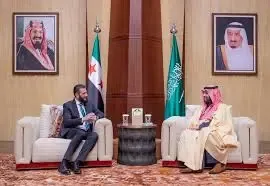
Synopsis
Key Takeaways
- Al-Sharaa's visit to Saudi Arabia highlights its strategic role in Syria's post-conflict transition.
- The trip marks a crucial step towards Syria's reintegration into the Arab world.
- Saudi Arabia's approach reflects its ambition to reclaim leadership in the Arab community.
- Strengthened ties with Saudi Arabia could aid Syria's economic recovery.
- Al-Sharaa's discussions emphasized cooperation in key sectors such as energy, healthcare, and technology.
Damascus, Feb 6 (NationPress) The inaugural overseas trip of Syrian interim President Ahmed al-Sharaa since his appointment has attracted significant regional and international interest, indicating a fresh beginning in Syria's foreign relations.
Analysts assert that al-Sharaa's visit to Saudi Arabia highlights the Kingdom's pivotal role in guiding Syria's post-conflict evolution, as well as its broader initiatives aimed at restoring stability in the region.
In the company of high-ranking officials, al-Sharaa engaged in discussions with Saudi Crown Prince Mohammed bin Salman, representing a vital move towards Syria's reintegration into the Arab community and the realignment of regional partnerships.
According to Syrian political expert Anas Joudeh, the founder of the Nation Building Movement, 'Saudi Arabia is not simply acknowledging the new government; it is actively influencing the future of Syria to align with its long-term regional aspirations.'
He noted that Riyadh's strategy reflects its ambition to reclaim its pre-1958 position prior to its merger with Egypt, seeking to restore its leadership role in the Arab world.
By playing a significant role in Syria's stabilization, the Kingdom enhances its status as a crucial regional powerbroker, ensuring that the transition remains orderly and avoids chaos or renewed conflict.
For Saudi Arabia, ensuring stability in Syria transcends geopolitics; it is also a matter of security and economic importance.
After his discussions with Saudi leadership, al-Sharaa expressed appreciation for the Kingdom's hospitality and reiterated his commitment to fostering strong bilateral relations.
'We engaged in comprehensive talks covering various sectors, aiming to elevate our cooperation, especially in the humanitarian and economic realms,' he stated.
The interim President of Syria emphasized vital areas for future collaboration, such as energy, technology, education, and healthcare, according to reports from the Xinhua news agency.
'Together, we are establishing the groundwork for a genuine partnership focused on ensuring regional peace and stability while enhancing the economic conditions for the Syrian populace,' he remarked.
The visit also addressed Syria's role in both Arab and international matters. Al-Sharaa asserted that the new leadership in Damascus is dedicated to 'restoring Syria's rightful status within the region' and promoting diplomatic engagements that serve the nation's interests.
Saudi media channels extensively reported on the visit, portraying it as a critical juncture for both nations.
In a piece for the Saudi newspaper Al-Riyadh, columnist Nawal Al-Jabr remarked that al-Sharaa's selection of Saudi Arabia for his initial official visit signifies 'a profound recognition of the Kingdom's political significance and international stature.'
She stressed that the visit occurred at a crucial moment for Syria as the nation seeks to secure economic assistance and diplomatic support.
She also noted Saudi Arabia's efforts to facilitate Syria's re-entry into the Arab League and advocate for the removal of Western sanctions, which pose a significant barrier to Syria's recovery.
In an article for the Saudi newspaper Okaz, columnist Mohammed Al-Saed questioned, 'What necessitates the new Syria's reliance on Riyadh?' He argued that Saudi Arabia has historically served as a mediator in resolving regional disputes, making its involvement in Syria's transition essential.
Al-Saed contended that a stable and economically integrated Syria would benefit from enhanced relations with Arab nations, particularly Saudi Arabia, which could facilitate financial investments and diplomatic legitimacy.
While al-Sharaa's visit to Riyadh represents a significant milestone, Syrian political analyst Maher Ihsan warns that much is still uncertain. The success of Syria's transition relies on various elements, including economic recovery, security consolidation, and political reconciliation.
Saudi Arabia's active participation in Syria's future may prove crucial in stabilizing the war-affected country, reducing external interference, and promoting sustainable development.
Simultaneously, for Damascus, Riyadh's diplomatic and financial influence presents an opportunity to rebuild institutions, enhance governance, and navigate the intricate regional landscape.
In summary, al-Sharaa's visit signifies Syria's endeavors towards Arab integration and a future shaped by economic and political collaboration.


